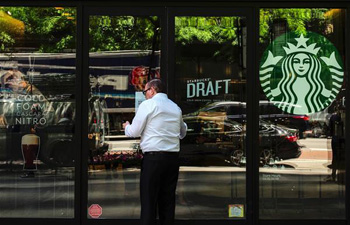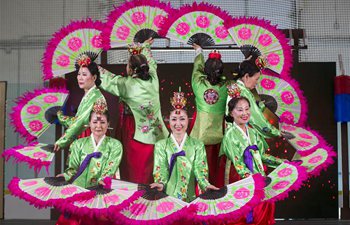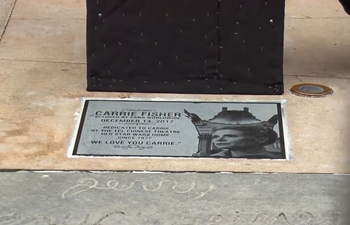By Peter Mertz
SALT LAKE CITY, the United States, May 27 (Xinhua) -- Howard Stephenson travels across the United States giving speeches to national educators about Utah's pioneering, decade-old effort to jointly teach Chinese and English in the state's public schools.
Stephenson is a Utah state senator and a national spokesman for Chinese language immersion, and the 12,000 Utah students who take Mandarin daily can thank this man for their ability to learn the most important language of the 21st century.
From coast to coast, Stephenson is a sought-after speaker, telling how and why Utah leads the nation in Chinese immersion studies.
But when he reaches the podium to speak, he always honors his son, Daniel.
"Not only has learning Chinese increased his intellect, confidence and employability, but it has increased his compassion and empathy," said the glowing senator to hundreds last week at the National Language Conference in Salt Lake City.
Those remarkable accolades, heaped on the senator's youngest son, are repeated at every campaign stop the 35-year elected politician makes toward making bilingual, Chinese-English education a national priority.
In her 1989 blockbuster book and Hollywood movie "The Joy Luck Club," Amy Tan predicted that only three languages will be spoken on Earth in the future: Spanish, English, and Chinese.
Since Tan's blockbuster, Spanglish has gotten a permanent American foothold, China's economic and geo-political influence has skyrocketed, and the latter two tongues have emerged as the unquestionable global language links of the future.
Next week Sen. Stephenson will speak in Philadelphia to the National Security Education Board, its six presidential appointments, and its board of high-level Department of Defense (DOD) officials.
Now considered an American educational heavyweight, Stephenson's son remains the same, whether it's repeated to American liberal educators in Wisconsin or DOD brass in Washington: Get on board the China Express. Now! And at each stop on the American education circuit, Dan's story is the cause de celebre.
Dan Stephenson is a living proof of why every, single, public school student in America should be studying Chinese, the elder Stephenson says of his youngest child.
THE SENATOR'S SON
Dan Stephenson was as naive as his father about China and Chinese culture when the duo crossed the Pacific for the first time together in 2000.
His conservative dad, newly elected to the Utah senate, had been asked to speak about family and education at a conference that included 1,000 students from Russia, America, and China.
The senator was 49 and his son 23. It was a 4-day trip that changed their lives forever.
On that trip, young Stephenson was a typical, normal, American kid. He was also a good kid - working, taking college classes, and interested in business. But he wasn't "super-interested" in anything.
As the days passed, the elder statesman was "stunned" about how superior and advanced the bilingual, Chinese kids were compared to the other international kids - including his own, beloved son.
Returning to the states, Sen. Stephenson doubled down on a passionate, perilous, political path - to allow 50 percent Chinese/English classes taught every day of the week to Utah's public school kids.
And while the father of five is quick to compliment his son today, he's also quite candid about Dan's lack of maturity and intellectual depth just a few yeas ago. But all that changed overnight.
TRANS-PACIFIC STEPHENSONS
Within a year of his Chinese baptism, young Dan was back in Beijing, speaking little Chinese, 6,100 miles (10,300 kilometers) from home, and jumping into the adventure of a lifetime.
"One important point here is that it doesn't matter what you think about China," Dan Stephenson, 41, told Xinhua Friday, reflecting back on his remarkable Chinese journey over the past two decades.
In an exclusive interview with Xinhua, the senator' s son explained why he has dedicated his life to increasing understanding and cooperation between the two most powerful countries and economies in the world today.
"Regardless of what happens between the two governments, it is critical for both peoples to have the mechanisms to deal with each other," the younger Stephenson emphasized.
Not afraid of challenges, young Stephenson's Chinese debut in 2002 was attending China's Harvard - Tsinghua University.
But Stephenson courageously gobbled up all the Mandarin they could feed him, and asked for more. He met William Wang, his future business partner and a Chinese national also passionate about uniting the two cultures. He got to know Chinese government officials and worked for ambassadors. And he stayed in China for almost another decade.
Tsinghua was an ambitious landing for young Stephenson, coming from Draper, Utah and its 47,000 people - to Beijing's 20 million, all speaking Putonghua - a radical change and challenge for the senator's son.
A young, sheltered American kid, Stephenson was thrust into a sink-or-swim scenario.
And just like Michael Phelps' Olympic performance in 2008, 6.8 km away at the Water Cube where he swam to a record 8 gold medals, Stephenson adapted, adopted, and thrived.
Ironically, at those Olympic Games, Stephenson's ambassadorial skills were honed in serependous, thrilling fashion when he accompanied Jamaican superstar sprinter Yusein Bolt and his family.
At Beijing's Birds Nest stadium, Bolt exploded from a tight field to win gold in the men's 100m dash thus becoming the fastest man alive. Bolt then dominated men's sprinting for three straight Olympic games, until 2016.
"I got to meet him and his family, along with the other athletes from Jamaica," Stephenson said, who spent days helping the Jamaican Olympic team adjust to language and cultural challenges in Beijing.
"It was a real honor for me to spend time with them," he said.
Stephen's connection to Jamaica was one of his first ambassadorial stops after graduating from Tsinghua.
In July 2005, when Jamaica's embassy opened in Beijing, Dan was critical toward a seamless exchange between the two disparate cultures that interestingly completed a cultural; global full circle that began in 1854 when Chinese settlers first migrated to the Caribbean nation.
By 2006, Stephenson was helping with a painting exhibition in Beijing, and other arts and sports exchanges followed, before the 2008 Beijing games.
CHINESE CONNECTIONS EXTRAORDINAIRE
In 2012, the young entrepreneur started Economic Bridge International Management Consultants where his team of Beijing bilingual associates facilitates business and cultural exchanges between the U.S. and China.
Not one to waste time, the following year, Stephenson jumped into Bennett Group International as the director of international business development.
In 2014, he cofounded the Zi Chinese Dual Language Immersion Foundation, based in Shanghai and Salt Lake City, with his Tsinghua classmate William Wang, to promote Chinese dual language learning throughout the United States.
And by 2015, the young entrepreneur was at it again, jumping on board with the Beijing-based China Academy of Painting, China's premiere painting association, founded in 2002, that helps to promote and preserve China's ancient art record as well as its renowned calligraphy.
"Involved in a number of ventures..." Stephenson admits modestly, as he works doggedly each day with several businesses and a number of ongoing cultural exchanges at the embassy level.
And to make the education piece work, Stephenson is neck deep in economic partnerships - the critical, challenging task of "getting the private sector to underwrite these exchanges," he said.
"Cultural changes show how alike we are, and how much we have in common," Stephenson said of his focus. "There's so much opportunity in the world to explore different cultures and find collaboration," Stephenson told Xinhua.
Person to person exchanges - especially where students can interact with each other, are the most valuable, asserts Stephenson.
His 2012 venture, Economic Bridge, has overseen a number of exchanges between "Chinese and Utah students: to get to know each other, and get to know more about each other's countries," Stephenson said.
"There are such a wide variety of things that can be done now - at a time when these exchanges are more and more valuable than ever," he told Xinhua.
Recently, these exchanges have included work with Spain's Cervantes Institute, and arranging a music festival in Beijing that involved six Nordic countries and 30 musicians, all in a day's work for the young bridge builder.
A FAMILY AFFAIR
So in the new millennium's first decade, while Howard Stephenson battled Utah legislators and special interest groups back in America over his ambitious Chinese-English learning paradigm, back in PRC, another Stephenson joined the cause.
In 2014, Dan's older brother, Andy Stephenson jumped into the Zi Chinese Dual Language Immersion Foundation, where he works to sell Chinese language in the states.
Meanwhile, Dan has expanded Zi's reach inside China - to Shanghai, where he works with his Shanghai-based business partner and Shanghai Jiao Tong University.
Recruiting teachers in China, working with the Confucius Institute, talking to his brother and father each day - all part of Dan Stephenson's busy life and commitment to American-Chinese connectedness.
"I see it as trying to push out the Utah model and show other states and school districts around the country the cost-effective nature of the Utah model," he said of the burning Stephenson family desire to promote Chinese language in the USA.













